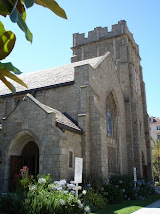After the Sabbath, at dawn on the first day of the week, Mary Magdalene and Mary, mother of James and Joseph, went to look at the tomb. There was a violent earthquake, for an angel of the Lord came down from heaven and, going to the tomb, rolled back the stone and sat on it. The angel‘s appearance was like lightning, with garments white as snow. The guards shook with fear and fell as though they were dead. The angel said to the women, ―Do not be afraid, for I know that you are looking for Jesus, who was crucified. He is not here; he has risen, just as he said. Come and see the place where he lay. Then go quickly and tell the disciples: ‗He has risen from the dead and is going ahead of you into Gali-lee. There you will see him.‘ Now I have told you.‖ So the women hurried away from the tomb, with awe and great joy, and ran to carry the good news to the disciples. Suddenly Jesus met them. ―Shalom,‖ he said. They came to him, embraced his feet and worshiped him. Then Jesus said to them, ―Do not be afraid. Go and tell the disciples to go to Galilee; there they will see me.‖Reflection -- Anne Breck Peterson
During my years at All Saints it has been my privilege to participate in the memorial services of a host of amazing individuals I have worked with, known, admired and loved. Each service is planned taking into account the person‘s favorite hymns and passages of scripture—a process made easier if the individual has left a list of these things in a file somewhere. As I read this passage of Mary Magdalene at the tomb of her beloved friend Jesus, I realize I must make it clear to my family that this is the passage of scripture that affects me most deeply.
Sadly making her way to the tomb with her friend to anoint the body, Mary Magdalene experi-ences a shaking of the earth, a strange light in front of a tomb that is now empty, and guards in-ert with fear. Bidden to go and tell the others, she and her friend hurry to take the good news to the disciples, encountering the presence of Jesus in the process. I see Mary running to the disci-ples, exclaiming, ―I have seen the Lord!‖ Her surprise and delight communicate such energy to me. It makes me wonder in what ways I am living as if I had ―seen the Lord.‖
The most difficult death I have experienced was that of my adored father and last parent in 2000. During the months he was moving toward the end of his life, I was also helping my daughter to prepare for her marriage. He died two weeks before her wedding. A month later, I returned from Thanksgiving with my dear stepmother and her wonderful family where we had given away all his worldly goods. I was exhausted.
My colleagues agreed to pick up the plan-ning of Christmas services while I went to a friend‘s beach house to sleep and then to a psycho-therapist I had checked in with during other crises. He asked me what qualities in my father I admired most. As I listed them he asked, ―Which of those reside in you?‖ I felt a shift in my being, a moving to a new place, claiming some of the attributes I had so loved in him. I look back on this as a resurrection experience for me as I experienced life in a new way.
As Mary runs to tell the disciples, and as they themselves experience Jesus‘ presence, some-thing changes in them. No longer are they the followers who don‘t get the punch lines of his stories or who try to dissuade him from walking the bold journey that cost him his life. They, too, are able to claim for themselves some of the qualities they admired in Jesus and are fired up to take his life changing story to the ends of the earth.
—What in the Easter experience energizes you?
—What will you do with that energy?
—What has been a resurrection experience for you?



